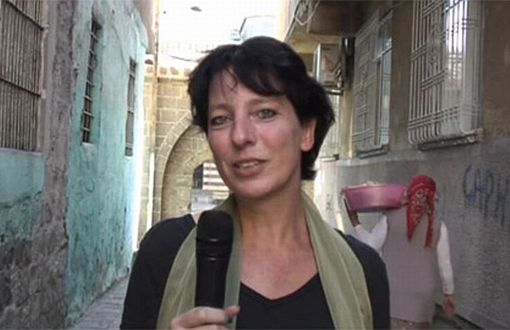Diyarbakır 6th High Criminal Court acquitted Dutch journalist Frederike Geerdink who was on trial for “illegal organization propaganda” in three of her articles and her social media posts.
The public prosecutor had argued for Geerdink’s acquittal on the first trial of the case held on April 8th, but the verdict was delayed until today because the Diyarbakır 6th High Criminal Court’s own judge was off-duty. The Dutch journalist who stood trial again today was acquitted.
Present at the trial on April 8th were many spectators such as Dutch Embassy First Clerk Political Affairs Peter van der Bloemen, Reporters without Borders (RSF) European Branch representative Johann Bihr, Froukje Santing representing European Federation of Journalists (EFJ), Amnesty Organization observer Marjanne de Haan, and İletişim Publishing executive Tuğrul Paşaoğlu come to support Geerdink, defendant without arrest who stated outside the courthouse that she expects to be acquitted. Numerous journalists from German, Dutch and British media were also present at the trial.
Prosecutor called journalism, requested acquittal
The prosecutor of the case in his opinion as to the accusations said that though the case was filed against interviews, news pieces and messages shared over social media and based on article 7/2 of the Anti-Terror Law (TMK), the conditions accepted and introduced on 11 April 2013 of ‘adopting the methods of violence’ were not satisfied, and the opinions expressed ought to be evaluated in the scope of journalistic activity.
The relevant article of the TMK had been changed in 2013 to state: “Anyone who engages in propaganda in such a way as to legitimate or praise the methods involving coercion, violence or threat of a terrorist organization or to promote resorting to these methods is sentenced to one to five years in prison. In the case where this crime is committed through the media, the sentence is increased by half.”
“I am a woman, I’m Dutch and I live in Diyarbakır, but”
Called to speak in her own defense, Geerdink defended herself saying: “An interview cannot constitute a crime no matter who it is done with.” She added that her writings and posts had been placed in the bill of indictment and interpreted after being taken out of context. “I am a woman, I’m Dutch and I live in Diyarbakır. First and foremost I am a journalist,” Geerdink said.
Demir: Journalism is being criminalized
Geerdink’s attorney Ramazan Demir expressed in his defense that the accusation rests on two articles that appeared in the news website Diken, titled “Kurds are savage, are they?” and “Mr. Prime Minister, please don’t make me have to be a war correspondent”, as well as an article titled “Kurds and/or what is the identity under the surface?” that appeared on the site Kurdishmatters and a caricature, and added that journalism is being criminalized.
Drawing on the European Court of Human Rights’ (ECHR) Güler & Uğur verdict dated 2 December 2014 and finalized on 2 March 2015 that convicted Turkey from article 7 of the TMK, Demir recalled ECHR’s explanation that article 7/2 of the law does not in fact have a legal quality as it lacks the elements of “predictability and clarity”.
An inhabitant of Turkey since 2006 and of Diyarbakır province since 2012, journalist Geerdink has written a book called “De Jongens Zijn Dood” (The Children are Dead) where she examines the Kurdish problem, wardens, contraband, unidentified murders and village evacuations by looking at Roboski (EÖ/PU).
Click here to read this article in Turkish.












